Upcoming Cannabis Legalization Updates in the US: Essential Info.
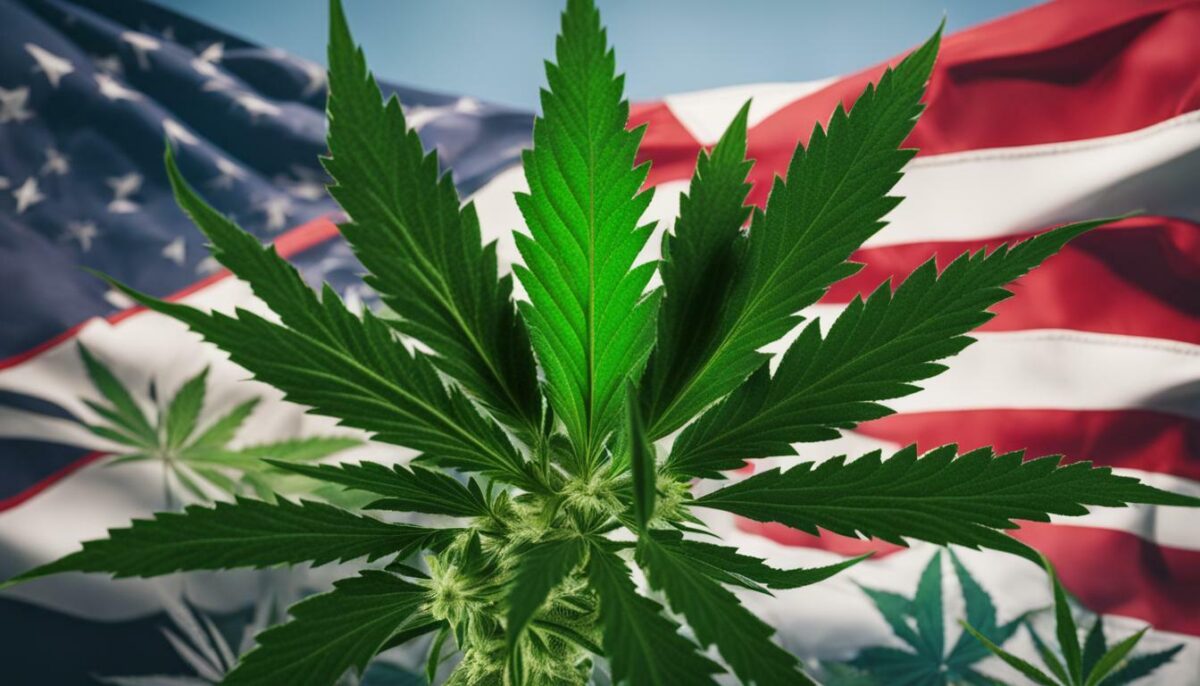
As cannabis reform continues to gain traction at the federal level, it is crucial for individuals and businesses to stay up-to-date on the latest cannabis legalization updates in the US. The cannabis industry is evolving rapidly, with changes in laws and regulations happening frequently. Being well-informed about these updates is essential for those involved in the cannabis industry, as well as for those who may be considering entering the market.
Key Takeaways:
- Upcoming cannabis legalization updates in the US are important for individuals and businesses to stay informed about.
- The cannabis industry is constantly evolving, with changes in laws and regulations happening frequently.
- Being up-to-date on cannabis legalization updates is crucial for those already in the industry and those considering entering it.
The SAFE Banking Act: Expanding Financial Services for Legal Marijuana Businesses
One significant upcoming cannabis legalization update in the US is the potential passage of the SAFE Banking Act, a bipartisan bill that aims to expand banking services for legal marijuana businesses. Currently, due to federal laws, banks and financial institutions are hesitant to provide services to cannabis-related businesses, leaving them with limited access to traditional financial services. However, the SAFE Banking Act seeks to address this issue by allowing these businesses to use major financial institutions without fear of federal prosecution.
The bill is expected to have a significant impact on the cannabis industry, as it would provide legal marijuana businesses with the ability to operate more like traditional businesses. By allowing access to banking services, these businesses would have a safer and more efficient way to manage their finances, including accepting electronic payments, making loans, and accessing credit. This would not only benefit the businesses themselves but also contribute to the overall growth and stability of the cannabis industry.
The SAFE Banking Act has gained bipartisan support, with both Republicans and Democrats recognizing the need for financial services in the legal marijuana industry. Several influential Republican senators, including Steve Daines of Montana, Kevin Cramer of North Dakota, and Susan Collins of Maine, have signed on as co-sponsors of the bill, indicating their support for its passage. This bipartisan support is essential for the bill’s success, as it increases the likelihood of reaching the required votes for approval.
| Support for the SAFE Banking Act | Opposition to the SAFE Banking Act |
|---|---|
|
|
Despite the growing support for the SAFE Banking Act, there are still potential challenges and opposition that the bill may face. Some law enforcement officials and conservative groups oppose marijuana legalization in any form and may push back against the bill. Additionally, the ever-changing political landscape and potential roadblocks in Congress could hinder the bill’s progress.
Overall, the passage of the SAFE Banking Act would be a significant development for the legal marijuana industry in the US. By expanding financial services for legal marijuana businesses, the bill would not only address the current challenges they face but also pave the way for further growth and stability in the industry. It remains to be seen whether the bill will successfully navigate the legislative process and become law, but its bipartisan support and recognition of the need for financial services are promising signs for the future of the cannabis industry.

The Importance of the SAFE Banking Act
“The SAFE Banking Act is crucial for the growth and stability of the legal marijuana industry. It provides legal marijuana businesses with the financial services they need to operate more efficiently and securely. By allowing these businesses to access banking services, we can promote transparency, accountability, and the overall development of the industry.”
The passage of the SAFE Banking Act would not only benefit legal marijuana businesses but also have broader implications for the economy and society as a whole. It would create opportunities for job growth, tax revenue generation, and increased access to safe and regulated cannabis products. Additionally, the bill aligns with the changing public opinion regarding marijuana, as more states continue to legalize its use for medical and recreational purposes.
As the SAFE Banking Act moves through the legislative process, it is important for stakeholders and interested parties to stay informed and engaged. Tracking the progress of the bill, understanding its potential impacts, and voicing support can all contribute to the successful passage of this crucial legislation.
Senate Markup Session for the SAFE Banking Act
The Senate Banking, Housing, and Urban Affairs Committee is set to hold a markup session for the SAFE Banking Act, bringing the bill one step closer to potential passage and a Senate floor vote. This session, scheduled for the week of Sept. 25, will allow senators to debate and consider amendments, an important process in advancing the bill.
Multiple sources familiar with the talks have expressed confidence that the SAFE Banking Act has enough support from both Republicans and Democrats on the committee to pass the Senate when it comes up for a full vote. Senators like Steve Daines of Montana and Kevin Cramer of North Dakota have stated their optimism about the bill’s chances.
The SAFE Banking Act is a bipartisan bill that aims to expand banking services for legal marijuana businesses. Currently, these businesses face difficulties accessing major financial and banking institutions due to the federal prohibition on marijuana. The passage of this bill would provide legal marijuana businesses with the ability to use banks without fear of federal prosecution.

The markup session in the Senate Banking, Housing, and Urban Affairs Committee is an important step towards the potential passage of the SAFE Banking Act. It will determine the changes and amendments to be made to the bill before it moves forward for a Senate floor vote. With the bipartisan support and increasing recognition of the need for banking services in the legal marijuana industry, the bill has a promising chance of advancing through the Senate.
A successful passage of the SAFE Banking Act in the Senate would be a significant development for the cannabis industry, providing legal marijuana businesses with the ability to access financial services, improve safety measures, and contribute to the overall growth and stability of the industry.
Bipartisan Support for the SAFE Banking Act
Both Republicans and Democrats on the Senate Banking, Housing, and Urban Affairs Committee have expressed support for the SAFE Banking Act, showcasing the bipartisan nature of the bill and its potential for success. The legislation aims to address the banking challenges faced by legal marijuana businesses by allowing them to use major financial and banking institutions without the fear of federal prosecution.
According to multiple sources involved in the process, the committee is expected to hold a markup session for the SAFE Banking Act at the end of the month, paving the way for a full Senate vote. Sen. Steve Daines (R-Mont.) expressed cautious optimism that the bill could pass before the end of the month, highlighting the growing support among both Republicans and Democrats.
“We’ve got enough votes to get it passed,” Sen. Daines said.
The bipartisan support for the SAFE Banking Act extends beyond the committee, with a growing number of Republicans co-sponsoring the bill. Senators such as Dan Sullivan and Lisa Murkowski of Alaska, Bill Cassidy of Louisiana, and Susan Collins of Maine have all signed on as co-sponsors, signaling a shift in attitudes towards marijuana in conservative-leaning states.
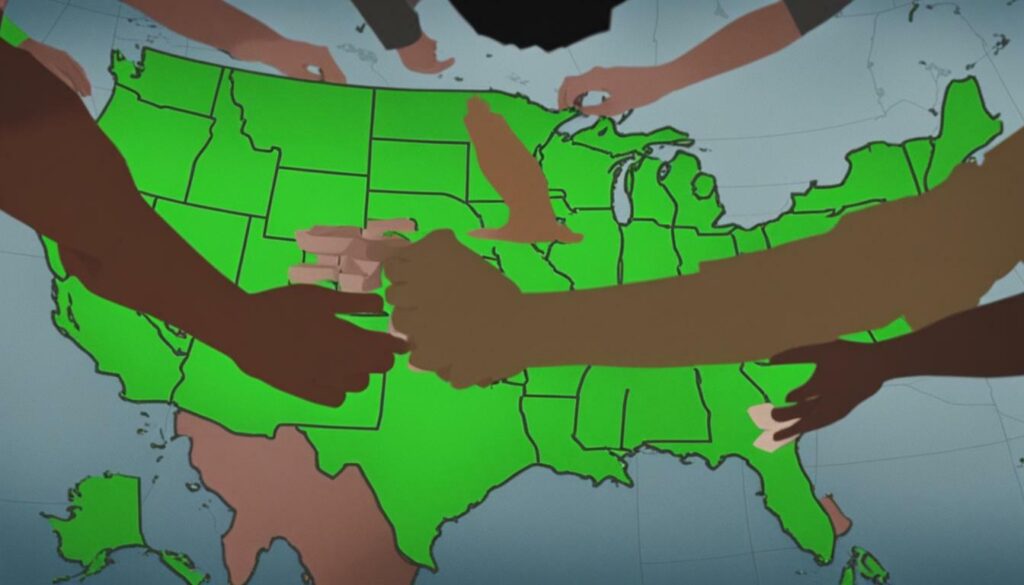
However, the fate of the bill in the House of Representatives is less certain. Despite support from Republicans in leadership roles, including Speaker Kevin McCarthy of California, who voted for the bill in the past, McCarthy has not indicated whether he will prioritize the SAFE Banking Act this time. The delicate majority in the House has complicated his decision-making process.
Opposition to the bill also exists, particularly from law enforcement officials and conservative groups who oppose marijuana legalization. Sen. Tommy Tuberville (R-Ala.) faced backlash from these groups, causing him to withhold formal endorsement of the legislation. However, Tuberville’s spokesperson affirmed his support for the bill during the floor vote.
Bipartisan Support for the SAFE Banking Act
The growing bipartisan support for the SAFE Banking Act, both in the Senate and among Republicans, highlights the changing perceptions of the legal marijuana industry. Lawmakers from red states where recreational cannabis remains illegal are now backing legislation to improve the safety and transparency of the industry.
Support from both sides of the aisle is crucial for the success of the SAFE Banking Act, as it navigates the legislative process and seeks to establish a fair and secure financial framework for legal marijuana businesses. The bill’s momentum and bipartisan backing increase the optimism surrounding its potential passage and its ability to address the challenges faced by the rapidly growing cannabis industry.
The House’s Role in the Fate of the SAFE Banking Act
While the fate of the SAFE Banking Act in the House of Representatives is less certain, with Speaker Kevin McCarthy’s position on marijuana legalization remaining unclear, the bill has garnered support from Republicans in leadership roles. The SAFE Banking Act, which aims to expand financial services for legal marijuana businesses, has gained bipartisan backing and is seen as a potential catalyst for reform in the cannabis industry.
According to multiple sources, McCarthy, who voted in favor of the bill in previous years, has not yet indicated whether he will prioritize the SAFE Banking Act this time around. With a fragile majority complicating his tenure as speaker, McCarthy’s stance on marijuana legalization could influence the bill’s chances of advancement in the House.
The bill’s prospects in the House will also depend on the support it receives from both Republicans and Democrats. While a strong showing of support from Republicans in leadership roles, including McCarthy, is encouraging, the bill may still face challenges based on individual lawmakers’ positions and the broader political climate surrounding cannabis reform.
Despite potential roadblocks, the increasing acceptance and understanding of the benefits of legal marijuana businesses have led to a growing number of Republicans and Democrats supporting the SAFE Banking Act. The bill’s potential to enhance financial services for the cannabis industry and address public safety concerns related to cash-heavy dispensaries has garnered bipartisan support, signaling a promising outlook for its future.
The Potential Impact of Scheduling Decision on the Bill’s Fate
The fate of the SAFE Banking Act could also be influenced by the federal government’s review of marijuana’s legal status. Secretary Xavier Becerra of the U.S. Department of Health and Human Services has stated that the review is expected to be completed by the end of 2023, with a decision on marijuana scheduling provided to President Joe Biden. The outcome of this review, whether it involves rescheduling or descheduling marijuana, could have significant implications for the cannabis industry and the SAFE Banking Act.
If marijuana is rescheduled or descheduled, it would have far-reaching impacts on licensees, healthcare providers, financial services, employment, and the applicability of federal laws. The SAFE Banking Act’s provisions for expanding financial services to legal marijuana businesses would become even more crucial in a new regulatory framework, facilitating the growth and stability of the industry.
It is essential for industry stakeholders to closely monitor developments in the federal government’s review and understand the potential impacts on the cannabis industry. The final decision on marijuana’s legal status will shape the future implementation and effectiveness of the SAFE Banking Act, as well as other aspects of the marijuana industry.
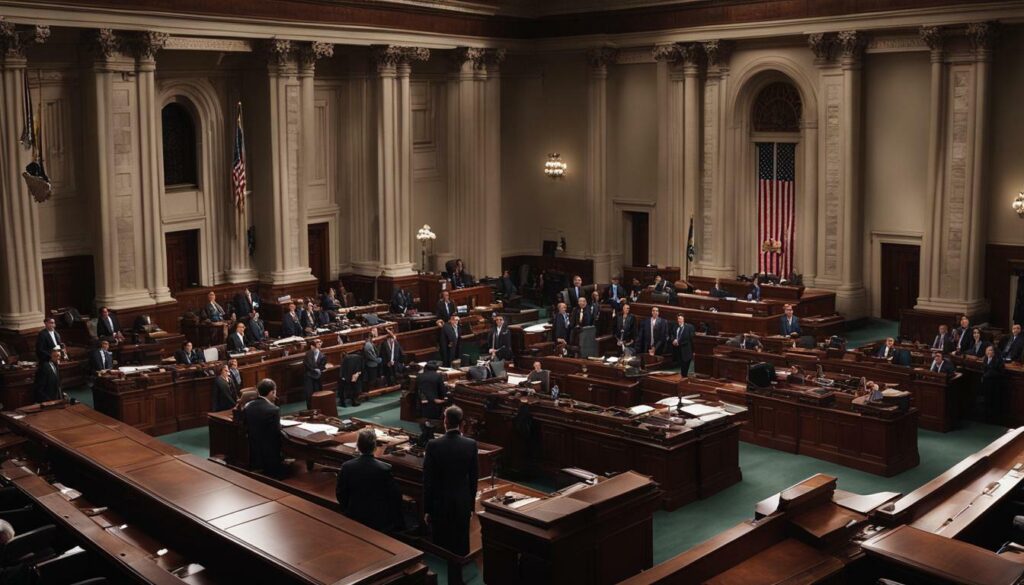
Current Marijuana Legalization Status by State
In addition to federal considerations, the marijuana legalization status by state also plays a significant role in shaping the fate of the SAFE Banking Act. As of September 1, 2023, 18 states have fully legalized marijuana for adult recreational use, while 37 states have legalized it for medical use. This patchwork of varying state laws creates challenges for the cannabis industry, highlighting the need for federal reform to provide consistent guidelines and regulations.
Understanding the current marijuana laws in each state is crucial for navigating the complex legal landscape. DISA Global Solutions provides an interactive map that clearly defines the laws in each state, including legalization status, medical use, and decriminalization. This resource allows businesses and individuals to stay informed about the legal status of marijuana in their state and make informed decisions.
| State | Legal Status | Medicinal | Decriminalized |
|---|---|---|---|
| Alabama | Mixed | Yes | No |
| Alaska | Fully Legal | Yes | Yes |
It is important for businesses and individuals involved in the cannabis industry to stay informed about state laws and regulations to ensure compliance and avoid legal issues. The interactive map provided by DISA Global Solutions is a valuable resource for navigating the ever-changing landscape of marijuana legality.
Potential Challenges to the SAFE Banking Act
Despite growing support for the SAFE Banking Act, there are potential challenges and roadblocks that could hinder its progress, including opposition from law enforcement officials and conservative groups. The bill, which aims to expand banking services for legal marijuana businesses, has garnered bipartisan support and is expected to be considered by the Senate Banking, Housing, and Urban Affairs Committee.
The opposition from law enforcement officials stems from concerns about the potential increase in criminal activity associated with cash-heavy marijuana businesses. These officials argue that allowing these businesses to access banking services could make them more vulnerable to robberies and other criminal incidents. Conservative groups, on the other hand, oppose the bill on the basis of their opposition to marijuana legalization as a whole.
Despite these challenges, supporters of the SAFE Banking Act remain optimistic about its prospects. They point to the bipartisan support the bill has received in both the Senate and the House of Representatives, as well as the growing recognition of the need for a regulated banking system for the legal marijuana industry. Additionally, the bill has the potential to address public safety concerns by reducing the reliance on cash transactions.

Law Enforcement Opposition
Law enforcement officials who oppose the SAFE Banking Act raise concerns about the potential increase in criminal activity associated with cash-heavy marijuana businesses. They argue that allowing these businesses to access banking services could make them more vulnerable to robberies and other criminal incidents. However, supporters of the bill argue that providing legal marijuana businesses with access to banking services would actually improve public safety by reducing the reliance on cash transactions, which are more susceptible to criminal activity.
Conservative Groups
Conservative groups oppose the SAFE Banking Act on the basis of their opposition to marijuana legalization. They argue that allowing legal marijuana businesses to access banking services would legitimize and enable an industry that they believe to be harmful. However, proponents of the bill emphasize the economic benefits that the legal marijuana industry can bring, including job creation and tax revenue, and argue that providing banking services to these businesses is a necessary step in promoting a regulated and transparent industry.
Potential Roadblocks
While the SAFE Banking Act has gained bipartisan support, its fate in the House of Representatives is still uncertain. Speaker Kevin McCarthy, who has previously voted in favor of the bill, has not indicated whether he will prioritize its passage this time around. Additionally, the bill may face challenges from conservative lawmakers who are opposed to marijuana legalization. Despite these potential roadblocks, supporters of the bill remain hopeful that it will advance and contribute to the continued growth and regulation of the legal marijuana industry.
Additional Criminal Justice Components and the HOPE Act
Some Democrats are pushing for additional criminal justice components to be included in the SAFE Banking Act, such as equity provisions for minority and women-run businesses, and are reintroducing the HOPE Act to encourage the expungement of marijuana misdemeanor convictions. These measures aim to address the historical inequities faced by marginalized communities in the cannabis industry and promote social justice.
Equity provisions would ensure that minority and women-run businesses have equal opportunities to participate in the legal cannabis market. By providing resources and support to these businesses, the hope is to create a more inclusive and diverse industry that reflects the communities it serves.
The HOPE Act, which stands for Helping Overcome Marijuana Prohibition Act, would establish a process for the expungement of marijuana misdemeanor convictions. This would give individuals with previous convictions a chance to rebuild their lives without the stigma and barriers that come with a criminal record.
These additional criminal justice components align with the broader movement towards criminal justice reform and recognize the disproportionate impact of marijuana prohibition on communities of color. By addressing these issues alongside banking access for legal marijuana businesses, lawmakers aim to create a more equitable and fair cannabis industry.
Table: Equity Provisions and the HOPE Act Summary
| Additional Criminal Justice Components | The HOPE Act |
|---|---|
| – Equity provisions for minority and women-run businesses | – Expungement of marijuana misdemeanor convictions |
| – Aim to address historical inequities in the cannabis industry | – Provide individuals with a chance to rebuild their lives |
| – Promote diversity and inclusion in the cannabis market | – Remove stigma and barriers associated with criminal records |
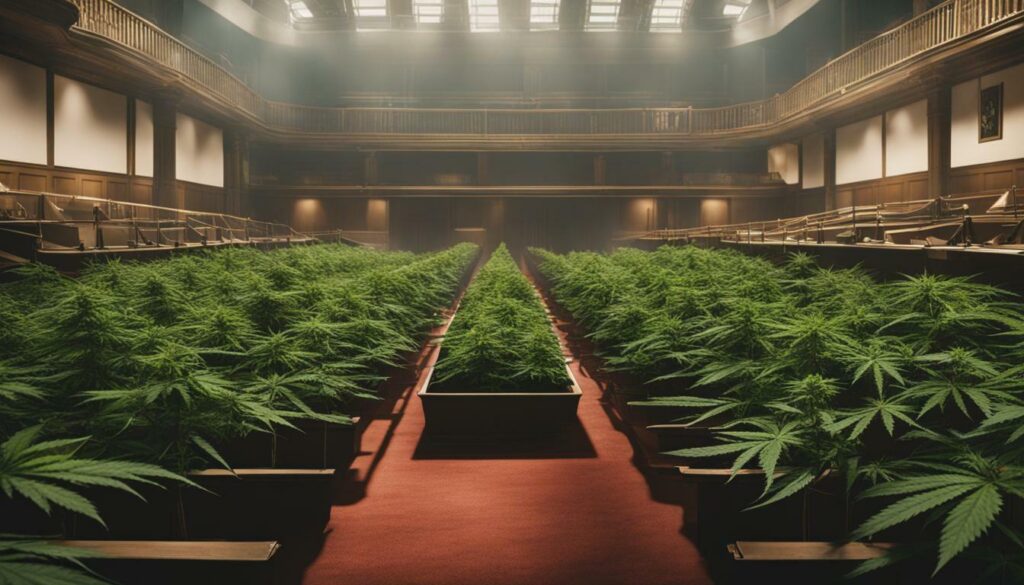
The inclusion of these additional criminal justice components and the reintroduction of the HOPE Act highlight the evolving priorities within the cannabis industry. As the push for legalization continues, it is crucial to address the inequalities of the past and create a more just and equitable system for all.
Federal Government Review of Marijuana’s Legal Status
The federal government is currently undergoing a review of marijuana’s legal status, with Secretary Xavier Becerra aiming to provide President Joe Biden with a cannabis scheduling decision by the end of the year. This review follows Biden’s Statement on Marijuana Reform, issued in October 2022, which instructed Becerra and U.S. Attorney General Merrick Garland to initiate the administrative process to examine how marijuana is scheduled under federal law.
If the federal government determines that it is appropriate to reschedule or deschedule marijuana, it will have significant implications for the marijuana industry, licensees, healthcare providers, financial services, employment, and the applicability of federal laws. Both rescheduling and descheduling could bring about dramatic changes and shape the future of the industry and related businesses.
The decision on marijuana’s scheduling will be based on scientific and medical considerations. The process involves evaluating the drug through the U.S. Food and Drug Administration (FDA) and reporting findings to the Attorney General. The Attorney General, in consultation with the DEA, also conducts its own research. Factors considered in determining the appropriate schedule or removal of marijuana from the CSA include its potential for abuse, scientific evidence of its pharmacological effect, current scientific knowledge, history and pattern of abuse, public health risks, dependence liability, and whether it is an immediate precursor to a controlled substance.
While the federal government’s review is still ongoing, the current legal status of marijuana varies by state. Some states have fully legalized marijuana, both for medical and recreational use, while others still consider it fully illegal. Many states have mixed laws, allowing either medical use, decriminalization, or limited CBD oil use. It’s important for individuals and businesses to understand the laws in their state to ensure compliance and avoid any legal issues.

Potential Impacts of Rescheduling or Descheduling Marijuana
If marijuana is rescheduled or descheduled, it will have wide-ranging effects on various aspects of society. Licensees in the marijuana industry could see changes in regulations and licensing requirements. Healthcare providers and doctors may have to adapt their practices and policies regarding medical marijuana. Financial services and banking institutions may become more accessible to marijuana businesses, leading to increased financial stability and growth for the industry. Employment laws and regulations may also be impacted, affecting both employers and employees. Additionally, the applicability of federal laws in relation to marijuana could change if the legal status is altered.
Marijuana Legalization Status by State
The current legalization status of marijuana varies by state, with some states fully legalizing it for both medical and recreational use, others allowing only medical use or decriminalization, and some states considering it fully illegal. It’s crucial to understand the laws in each state to ensure compliance and avoid legal issues. To stay updated on the latest changes in marijuana legalization across the United States, refer to the interactive map provided below:
State Legal Status Medicinal Decriminalized Alabama Mixed Yes No Alaska Fully Legal Yes Yes Arizona Fully Legal Yes Yes Arkansas Mixed Yes No California Fully Legal Yes Yes Colorado Fully Legal Yes Yes Connecticut Fully Legal Yes Yes Delaware Fully Legal Yes Yes District of Columbia Fully Legal Yes Yes Florida Mixed Yes No Georgia Mixed CBD Oil Only No Hawaii Mixed Yes Yes Idaho Fully Illegal No No Illinois Fully Legal Yes Yes Indiana Mixed CBD Oil Only No Iowa Mixed CBD Oil Only No Kansas Fully Illegal No No Kentucky Mixed CBD Oil Only* No Louisiana Mixed Yes Yes Maine Fully Legal Yes Yes Maryland Fully Legal Yes Yes Massachusetts Fully Legal Yes Yes Michigan Fully Legal Yes Yes Minnesota Fully Legal Yes Yes Mississippi Mixed Yes Yes Missouri Fully Legal Yes Yes Montana Fully Legal Yes Yes Nebraska Fully Illegal No Yes Nevada Fully Legal Yes Yes New Hampshire Mixed Yes Yes New Jersey Fully Legal Yes Yes New Mexico Fully Legal Yes Yes New York Fully Legal Yes Yes North Carolina Fully Illegal No Yes North Dakota Mixed Yes Yes Ohio Mixed Yes Yes Oklahoma Mixed Yes No Oregon Fully Legal Yes Yes Pennsylvania Mixed Yes No Rhode Island Fully Legal Yes Yes South Carolina Fully Illegal No No South Dakota Mixed Yes No Tennessee Mixed CBD Oil Only No Texas Mixed CBD Oil Only No Utah Mixed Yes No Vermont Fully Legal Yes Yes Virginia Fully Legal Yes Yes Washington Fully Legal Yes Yes West Virginia Mixed Yes No Wisconsin Mixed CBD Oil Only No Wyoming Fully Illegal No No
Disclaimer: The information provided in this table is for educational purposes only and should not be considered legal advice. Please consult state laws and consult an attorney or designated official for legal determinations.
Potential Impacts of Rescheduling or Descheduling Marijuana
If marijuana is rescheduled or descheduled at the federal level, it could have far-reaching impacts on various sectors, including the marijuana industry, licensees, healthcare providers, financial services, employment, and the application of federal laws. The potential effects of such a change are significant and require careful consideration.
Firstly, rescheduling or descheduling marijuana would have a profound impact on the marijuana industry as a whole. Currently, marijuana businesses face numerous challenges due to conflicting state and federal laws. Rescheduling or descheduling would provide clearer guidelines and regulations for businesses to operate within, allowing for growth and development in the industry.
Licensees, including growers, manufacturers, and retailers, would benefit from increased access to financial services. Currently, many banks and financial institutions are reluctant to provide services to marijuana businesses due to the federal prohibition on the drug. Rescheduling or descheduling would remove this barrier, allowing businesses to access banking services, loans, and other financial resources.
Healthcare providers would also be impacted by the rescheduling or descheduling of marijuana. Currently, doctors face legal and professional risks when discussing or recommending marijuana to their patients. Rescheduling or descheduling would allow for more research and understanding of the potential medical benefits of marijuana, opening up opportunities for healthcare providers to incorporate it into their treatment plans.
| Potential Impacts | Sectors Affected |
|---|---|
| Clearer guidelines and regulations | Marijuana industry |
| Access to financial services | Licensees |
| Research and medical use | Healthcare providers |
| Employment opportunities | Job seekers and employers |
| Consistency in federal laws | Legal system and law enforcement |
Furthermore, the rescheduling or descheduling of marijuana could have a significant impact on employment opportunities. Currently, individuals with marijuana-related offenses on their records face barriers to employment due to federal laws and regulations. Rescheduling or descheduling would provide greater clarity and consistency in employment laws, potentially opening up more job opportunities for individuals with previous marijuana-related offenses.
Lastly, the rescheduling or descheduling of marijuana would bring greater consistency to federal laws and regulations. Currently, the conflict between state and federal laws creates confusion and inconsistencies in the legal system and law enforcement. Rescheduling or descheduling would align laws at the federal level with those of states that have already legalized marijuana, creating a more streamlined and cohesive legal framework.
Summarize:
If marijuana is rescheduled or descheduled at the federal level, it could have far-reaching impacts on various sectors, including the marijuana industry, licensees, healthcare providers, financial services, employment, and the application of federal laws. Rescheduling or descheduling would provide clearer guidelines and regulations for the marijuana industry, open up access to financial services for licensees, allow for more research and medical use of marijuana by healthcare providers, create employment opportunities, and bring greater consistency to federal laws and regulations.

Marijuana Legalization Status by State
Understanding the marijuana legality status in each state is crucial for individuals and businesses, and this section provides an overview of the current laws regarding medical and recreational use, along with a link to an interactive legalization map for further information.
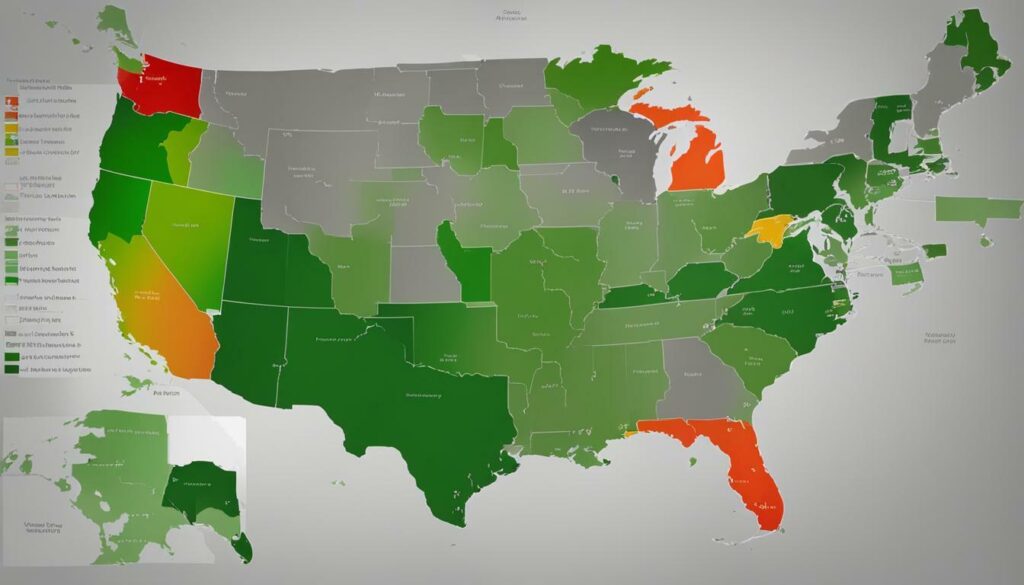
Marijuana laws are changing at a rapid pace across all 50 states, making it important to stay informed. The interactive legalization map below offers a clear and up-to-date understanding of the laws in each state. It includes information on legalization, medical use, recreational use, and anything in between.
With this map, you can easily navigate the varying regulations and restrictions that exist across the country. Whether you’re a resident or a visiting tourist, it’s crucial to understand and respect the rules specific to each state to avoid any misunderstandings or legal trouble.
| State | Legal Status | Medicinal | Decriminalized | State Laws |
|---|---|---|---|---|
| Alabama | Mixed | Yes | No | View State Laws |
| Alaska | Fully Legal | Yes | Yes | View State Laws |
| Arizona | Fully Legal | Yes | Yes | View State Laws |
Note: State status reflects current laws at the time of the update, not pending legislation or future dates upon which marijuana becomes available medicinally or recreationally. States with legislation that has passed but has a future enactment date will be marked with an asterisk (*).
Disclaimer: This information is provided for educational purposes only and not as legal advice or opinion. The reader retains full responsibility for the use of the information contained herein. For a determination of legal rights, employers or employees should seek the counsel of an attorney or designated official of the applicable regulating agency.
Conclusion
Staying informed about upcoming cannabis legalization updates in the US is essential for individuals and businesses alike to navigate the evolving landscape of the cannabis industry and ensure compliance with state and federal laws. With the potential passage of the SAFE Banking Act, legal marijuana businesses may soon have access to major financial and banking institutions, providing much-needed stability and legitimacy to the industry.
The bipartisan support for the SAFE Banking Act is a promising sign of progress, with both Republicans and Democrats recognizing the need for change in cannabis policies. However, there may still be challenges and opposition from law enforcement officials and conservative groups who oppose marijuana legalization.
Additionally, the federal government’s review of marijuana’s legal status and the potential rescheduling or descheduling of marijuana could have significant impacts on the industry, including the applicability of federal laws, financial services, employment, and the overall business landscape.
Understanding the current marijuana legalization status by state is also crucial for individuals and businesses to ensure compliance with local laws and regulations. With varying rules and regulations across states, it is important to stay informed and updated on the specific marijuana laws in each jurisdiction.
By staying informed and keeping up to date with cannabis legalization updates and US marijuana laws, individuals and businesses can make informed decisions, adapt to changes in the industry, and contribute to the growth and development of the cannabis market.
FAQ
Q: What is the SAFE Banking Act?
A: The SAFE Banking Act is a bipartisan bill that aims to expand banking services for legal marijuana businesses at the federal level. It would make it lawful for these businesses to use major financial and banking institutions, addressing the current issue of banks and creditors facing federal prosecution for providing services to legal cannabis businesses.
Q: When is the Senate markup session for the SAFE Banking Act?
A: The Senate Banking, Housing, and Urban Affairs Committee is expected to hold a markup session for the SAFE Banking Act the week of September 25th.
Q: Is there bipartisan support for the SAFE Banking Act?
A: Yes, both Republicans and Democrats on the Senate Banking, Housing, and Urban Affairs Committee support the bill. There are also several Republican senators who have signed on as co-sponsors.
Q: What is the fate of the SAFE Banking Act in the House?
A: The fate of the bill in the House is less certain, as it depends on Speaker Kevin McCarthy’s prioritization. While several Republicans in leadership roles have expressed support for the bill, McCarthy has not indicated whether he will prioritize it given the delicate majority in the House.
Q: Are there potential challenges to the SAFE Banking Act?
A: Yes, there may be potential challenges and opposition to the bill. Some law enforcement officials and conservative groups have expressed opposition to marijuana legalization and have urged lawmakers to reject the legislation.
Q: What additional components could be added to the SAFE Banking Act?
A: Some Democrats hope to add additional criminal justice components to the bill, including equity provisions for minority and women-run businesses and other criminal justice reform measures. However, it remains to be seen if these additions will be successful in the closely divided Congress.
Q: When is the federal government expected to make a decision on marijuana’s legal status?
A: According to Secretary Xavier Becerra of the U.S. Department of Health and Human Services, the federal government aims to finish its review of marijuana’s legal status by the end of 2023. This review follows President Joe Biden’s request for an administrative process to evaluate how marijuana is scheduled under federal law.
Q: What are the potential impacts of rescheduling or descheduling marijuana?
A: Rescheduling or descheduling marijuana could have significant impacts on the marijuana industry, including licensees, doctors, financial services, employment, and the applicability of federal laws. It could reshape the legal and economic landscape of the cannabis industry.
Q: What is the current marijuana legalization status by state?
A: The current marijuana legalization status varies by state. Some states have fully legalized marijuana for both medical and recreational use, while others only allow medical use or have decriminalized certain aspects of marijuana possession. To see the specific laws in each state, refer to the interactive marijuana legalization map.